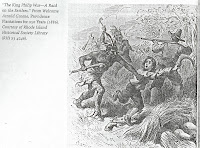 |
| King Phillip image by Paul Revere.jpg |
We have recently passed the anniversary of the December 19, 1675 Great Swamp Fight. Earlier that year the Wampanoag tribe, led by King Phillip, rose up against encroaching English settlers in Massachusetts. By the end of the year the battle was spreading, and it was feared that the Rhode Island’s powerful Narragansett tribe would join the Wampanoags. Most of the settlers on the west side of Narragansett Bay had already taken refuge on Rhode Island.
On December 16th a combined army from Massachusetts and Plymouth met at Wickford, Rhode Island. They planned to use Jireh Bull's garrison house at Pettequamscutt to rendezvous with a force from Connnecticut, and their Mohegan and Pequot allies. From there they would attack the Narragansetts’ principal fort in the Great Swamp. Then word came that Bull's garrison had been destroyed by the Narragansetts, and about 18 English settlers were killed there.
 |
| King Phillip's War.jpg |
It is said that James Eldred, about 15 years old, was one of two people who survived the massacre at Bull's Garrison. After escaping from the house, Eldred was chased along the stream by an Indian who came so close as to throw his tomahawk, which missed. The Indian grappled with James and drew his knife. Eldred was unarmed, but got the knife and killed his attacker. He heard another Indian approaching in the dark and fled, pursued closely. Eldred hid among rocks by the stream until pursuit passed. The stream is still called Indian Run.
Harking back to the Great Swamp Fight, which happened on December 19th, armies from Plymouth, Massachusetts, and Connecticut met at Pettequamscutt. They marched 15 miles through deep snow into the Great Swamp, to the Narragansett nation's winter village. It was surrounded by several yards of downed trees and brush. The English army broke in, killed hundreds of the Narragansett defenders and burned the village to drive away the survivors. 20 Englishmen died in the battle, and perhaps another 60 succumbed later. Some from their wounds, others from feet and hands frozen as the troopers retraced their tracks to the coast after the battle.
 | |
| Great Swamp Fight.jpg |
John Tefft was one of the few settlers who did not leave the western side of Narragansett Bay before the Great Swamp Fight. A letter written by Capt. James Oliver on 1/26/1676 mentions John’s death. He wrote that Tefft’s son Joshua had joined the Narragansetts and married a Wampanoag woman. During the Great Swamp Fight, Joshua fought against the English settlers.
Joshua was captured on January 14th while trying to steal cattle for food. He told his English captors that he had been seized by the Narragansetts 4 weeks before, and had promised to serve the sachem for the rest of his life if they would spare him. Joshua was taken to the Narragansett fort in the Great Swamp as the sachem's slave. The chief died of wounds received during the battle.
 |
| Great Swamp Fight memorial.jpg Image by Patti Cassidy |
His English captors did not believe Joshua's story, and Capt. Oliver declared that Joshua was a “sad wretch, he never heard a sermon but once these 14 years.” Though Joshua begged for his life, four days later he was executed. Many of the tales later told about him were possibly inflated; it was said he had actually joined the Indians 14 years earlier, renounced his nation and religion, and killed a miller as a pledge of his loyalty. It was true that he helped the Indians design the fort in the Great Swamp, and fought against his own people during the battle there. Joshua died a traitor's death in Providence, Rhode Island: hanged and his body cut into quarters to be displayed as a warning to others who might join the Wampanoags' battle.
In a sad coda to the loss of life on both sides of the Great Swamp Fight, John Tefft also died. Oliver wrote, "[Joshua's] father going to recall him (reclaim his body) lost his head at the hands of the Indians, and lies unburied."
Excellent and interesting article about Tabitha Tefft Gardner (Herodias Long Gardner's daughter in law)'s father John and brother Joshua. The Great Swamp Fight of 1675 was an important, but is an often overlooked chapter in colonial history.
ReplyDeleteTabitha Tefft and George Gardner were my 8th gr-grandparents, so it is very cool to read about her family members's involvement in this conflict.
Karen Yohn Fox